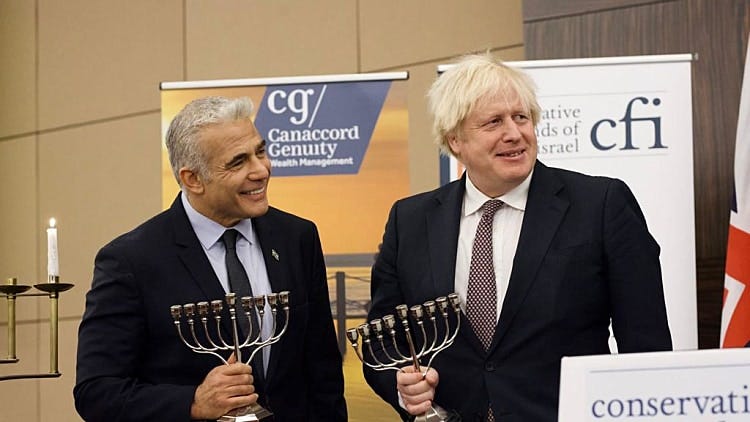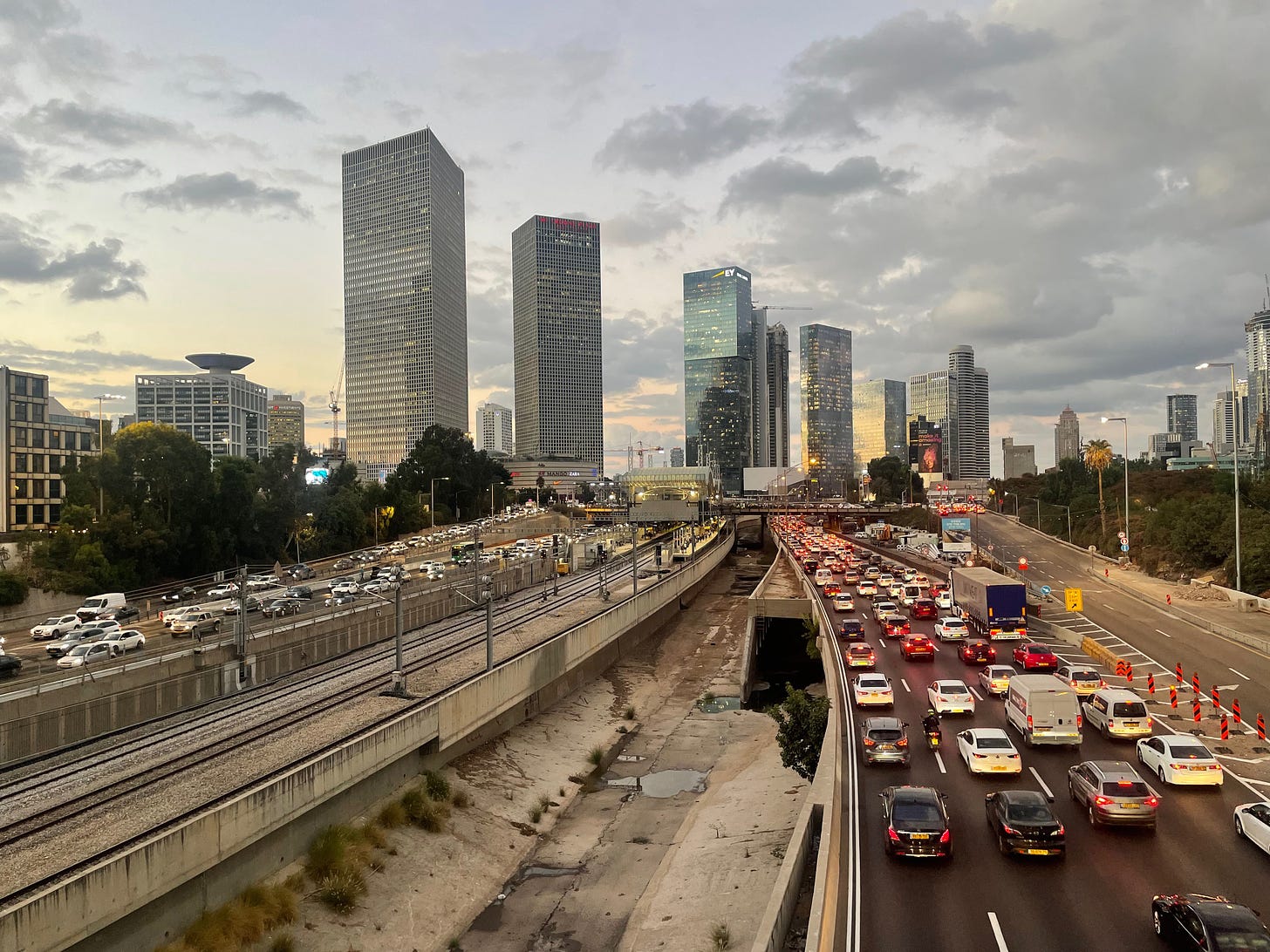Israel Update Week Ending December 3
Iran Talks including a guest post from Washington,Covid, Ultra Orthodox clash with new government and more
FOREIGN AFFAIRS
Most diplomatic eyes have been turned towards the Vienna talks. The Israeli government is unsure what its policy toward Iran should be, aside from saber-rattling — which it’s doing with gusto. In a recent interview, the Commander of Israel’s Air Force spoke, almost directly, of IAF preparations currently underway for a potential strike. On Thursday, Prime Minister Bennett had a conversation with US Secretary of State Blinken, in which Bennett reportedly asked the US to pull out of the Iran talks, due to Iran's actions. Not straightforward what these moves by Israel will accomplish. The call was initiated by Blinken, who wanted to reinforce US opposition to a plan to build housing on the grounds of the former Atarot Airport in East Jerusalem. The Israeli government has assured the Americans that the plan will not receive final approval.
You can listen to my views concerning the status of the Iranian negotiations, shared during my appearance on ILTV. On the broadcast, I debate the chairman of the Sadat-Begin Center, with whose views I wholly disagree.
In addition, I am happy to include the insights of a guest poster this week — Kyle Inan, a Washington-based analyst, who will provide the view from Washington regarding the Iranian agreement. His post is at the bottom of regular post.
Reports from Vienna, where the first round of talks concludes today, is that the Iranians were not serious. Iranians demanded both more sanctions relief, and fewer constraints on their nuclear program than had been agreed to in June. They were told to go back to Teheran and get new instructions.
On the diplomatic front, Foreign Minister Lapid visited Great Britain and met with Prime Minister Johnson and others in the administration. Lapid also met with Prince Charles. Next week, Defense Minister Gantz is off to Washington to meet US Defense Secretary Austin, as well as others in the Biden Administration.
DOMESTIC AFFAIRS/INSIDE ISRAEL
Domestically, one of the current political battles is over a proposed tax on sodas. The goal is to discourage the sale of high-sugar beverages, based on health concerns. Led by the local Coca-Cola bottlers, soda manufacturers are fighting back, trying to stop the Knesset from enacting this new tax. Manufacturers have focused their battle on gaining an exemption for diet sodas from the added charge.
Furthermore, after years of exempting family sized bottles from required recycling, the more economy-sized bottles will now also command a recycling deposit. Another part of the government’s plan to bring Israel's plastic consumption under control is a tax on disposable utensils and plates, which has already gone into effect. Previous attempts to pass these taxes all failed, due to opposition from ultra-Orthodox politicians. It should be noted that Israel utilizes four times the OECD average per capita in plastic.
Ultra-Orthodox leaders are having a hard time getting used to the fact that for the first time in a generation their political power is limited. They are upset about the taxes on plasticware. They are upset about the reforms in the Kashrut system. They fearful of a plan to allow members of their communities the right to retain their same phone number if they change service provider, or phone plan.
This week, a group of leading ultra-Orthodox Rabbis met with Communication Minister Yoav Hendel, to beg him not allow the change in telecommunication regulation to happen. According to a story by Ashe Pfieffer, Rabbi Eliezer Yehuda Finkel, dean of Yeshivat Mir said: “From our perspective, the cell phone decision is worse than the Holocaust”. What are they afraid of? If members of their community are able to switch plans and services from their accounts — that currently only support “Kosher” phones — then the Rabbis will no longer be able to know who does, or does not, have access to the internet, along with the thousands phone numbers currently blocked on the Kosher phones.
Violence in Arab-Israeli Communities
On Thursday, Muhammad Hamza Burgel Agbaria became the 117 victim of violence in the Arab-Israeli community this year. The 33 year-old was shot while driving in Umm al-Fahm. In response, four houses were set on fire overnight. This morning, a driver rammed his car into a group of Border Policeman in the town, wounding two. The driver was shot and killed. At the moment everyone is focused on the paralyzing problem of the rampant killings in the community. Tragically, no one currently has a plausible plan for how to stamp out this scourge.
COVID–19
Last Saturday night, the Corona cabinet met to discuss what actions Israel should take against the South African variant. The cabinet decided to go beyond the actions Prime Minister Bennett presented the day before, and announced that all of Africa, except North Africa, will be considered “Red Zones,” to which travel is prohibited. Furthermore, entry into Israel by all non-Israelis was suspended. All returning Israelis must enter a three-day quarantine, at which time they are required to take a second PCR test, which must be negative in order to be released from quarantine.
The Ministry of Transportation has barred Israelis returning to Ben Gurion airport to travel home via train, or bus.
As of Friday morning, seven Israelis have been confirmed to be infected with the Omicron variant. Three were fully vaccinated (i.e., 3 shots), and all recently returned from abroad. An additional four of the infected were unvaccinated and returned from South Africa.
There is a high level of suspicion that 27 others have been infected with the new variant. Of them, 22 are either unvaccinated, or not fully vaccinated. 19 of those potentially infected have not been overseas recently. Of those who are not fully vaccinated, 10 have symptoms, and 16, so far do not. Of the vaccinated only one in seven has symptoms. At least from this small sample, it's clear that those who remain unvaccinated are more likely to become infected by the variant. However, even those who have been vaccinated are still susceptible to the Omicron variant. The big question, as to the severity of the new strain is still unanswered. Severe illness and, of course, death are lagging indicators, and typically develop 1-2 weeks after infection.
In terms of regular Covid, Israel’s daily infection numbers remain steady — with 500+ new cases every day.
TEL AVIV, NAMED THE MOST EXPENSIVE CITY IN THE WORLD
Its official — I live in the most expensive city in the world. This week, the Economist showed that Tel Aviv has surpassed Paris as the most expensive city in the world. The major driving forces of this shift are the cost of housing and the cost of food. The cost of housing is a nationwide problem. However, the crisis is amplified in Tel Aviv, which remains the most desirable place to live.
Instead of providing solutions, the government has actually exacerbated the problem. Recently, (under the previous administration) the land formerly occupied by Sde Dov airport was sold to build housing. Did the government ensure that affordable housing would be built? No, it did not. The government chose to maximize its income, in a bidding process that netted government coffers an extra NIS 200 million, over the expected asking price. Tel Aviv’s challenges are magnified by the fact that a significant minority of its citizens work for high-tech companies, earning world class salaries. However, unless you inherited an apartment from your grandparents, everyone else (e.g., teachers, social workers, non-tech business workers) all earn salaries that make living in Tel Aviv almost impossible.
ECONOMY
Google Pay is expected to arrive in Israel next week. Nearly a year after Apple Pay arrived here, Google will join the fray. Last year, Bank of Israel insisted that all credit card machines be NFC-enabled by the end of this year. Almost all businesses have complied. As a result, nearly every business accepts Apple Pay, and will accept Google Pay. I still keep two credit cards in my wallet, in case a machine does not work. However, I almost never have to take out my credit cards anymore.
Fireblocks, Ltd. has raised an additional $400 million giving it a valuation of $8 Billion. The company provides a Digital Wallet for crypto for large institutions.
••••••••••••••••••••••••••••••••••••••••••••••••••••••••••••••••••••••••••••
Kyle Inan, Senior Geopolitical Analyst
Washington, D.C.
02.12.2021
The Vienna Deal for The P5 + 1 and Iran’s Push for Nuclear Enrichment
After a five-month shuttle diplomacy effort, negotiations to restore compliance with the Joint Comprehensive Plan of Action (J.C.P.O.A.), vis-à-vis the name given to the nuclear deal, resumed in Vienna on Tuesday between Iran and China, France, Germany, Russia and Britain with the U.S. (The 5 Permanent Members of the U.N. Security Council + 1) benched since it is no longer a party to the accord.
At the crux of the issue is Iran’s assertiveness in wanting assurances that if it does resume compliance with the J.C.P.O.A. Accord and agrees to give up the critical “fissile” material that it experts say that it has amassed, all previously imposed sanctions from financial to ballistic-missiles will be removed since President Trump annulled the deal in 2018 and Tehran is trying to ensure that the next U.S. president won’t rip it up again. Well, those conditions cannot be fulfilled according to the P5.
Israel, under the former Benjamin Netanyahu government, had furiously opposed the deal, even raising tensions with the Obama administration. On Tuesday, Prime Minister Naftali Bennett, after years into the agreement, once again clearly indicated that Israel was prepared to break relations with the U.S. and other allies to take action against Iran, if needed.
Not that it is solely the previous administration’s faux-pas, but the current Democratic administration under President Biden also did not play a strong hand particularly well, either. Instead of swiftly making a decision to cancel President Trump’s sanctions and restoring adherence, in return for Iran eliminating its uranium stockpile, President Biden chose to see who would go first in the Iranian nuclear deal while simultaneously causing a humanitarian crisis amidst withdrawal of U.S. troops and personnel (some still left in Kabul) from Afghanistan portraying a very flimsy image that is regarded as an operational setback to the international community.
This is preciously why we see Israel, though it is not a party to the talks, is lost in the Biden administration’s ambiguous approach to the J.C.P.O.A. Israel is worried that this would keep Iran a de-facto nuclear regional powerhouse and make it almost impossible for Israel to take military action against its facilities, since at that point Israel would be disrupting a U.S.-brokered deal.





